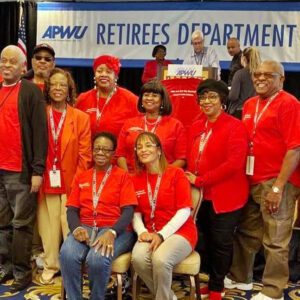August 6, 2025
How to Be an Effective Leader in Our Union and Beyond
(This article appeared in the July/August 2025 issue of The American Postal Worker magazine)
An effective leader must be able to influence and inspire other people. They must be a visionary and lead by example with a clear goal in mind. Effective leaders possess many qualities that set them apart from the crowd, often facing many challenges while being able to rise to the occasion. Such challenges include:
Accepting Criticism – Learn to sort out the constructive, from which they can learn, and the malicious, which should be ignored.
Withstanding Adversity – Things will not always go well. A good leader will bounce back.
Delegating Authority – Make assignments and follow up on the results. No leader can do it alone.
Always Doing What Is Best for the Organization – Never allow personal feelings to interfere with what is best for the organization.
Sharing Credit – Learn to praise others and to give credit when and where it is due.
Concentrating During Stressful Times – Stay focused and always keep the organization’s goals in mind.
Accepting Responsibility for Mistakes – Assume responsibility for one’s own mistakes and the mistakes of others.
Qualities of Effective Leaders
Both teamwork and leadership are essential to an organization’s success. Effective leadership requires essential qualities, such as:
Honesty – Have clear values and be consistent in applying them. Do the honest thing and never allow personal feelings to cloud one’s judgment.
Confidence – Know where they are going, outline specific and obtainable goals for the organization and stay the course.
Respect – Treat all people with dignity and respect.
Motivation – Possess the confidence to make decisions and instill confidence in others.
Compassion – Care about the organization and the people.
Being A Visionary – Be action-orientated and understand what is needed and how to achieve it. Solicit input so everyone feels their opinion is important.
Knowledge and Humbleness – Know the various resources available and keep abreast of current issues confronting the organization, but do not claim to know everything.
Level-headedness – Do not lose your cool under pressure. Do not panic, and do not be afraid to take risks or make mistakes.
Self-Awareness – Know your strengths and weaknesses and how to best utilize the strengths of others. Ability to Communicate – Clearly describe the objective and relate the vision to others, while working towards the organization’s goals.
Commitment – Lead by example, show that the organization is more successful when everyone works together.
Running an organization is a difficult job. If a leader expects others to work hard, they must lead by example. There is no greater motivation than seeing a leader working alongside everyone else.
Being able to inspire others is a great tool for focusing on the organization’s goals, and important issues affecting the organization. It is a leader’s job to keep spirits up and show appreciation for the hard work that officers and members perform.
We need each of you to become an effective leader. Reach out to your coworkers, family members, neighbors, faith-based organizations, and other organizations to inspire them to become involved in our fight to save the United States Postal Service.
Visit apwu.org/action for ways you can help.■
Resource material: APWU’s Leadership Development handbook.



